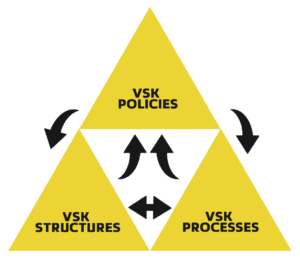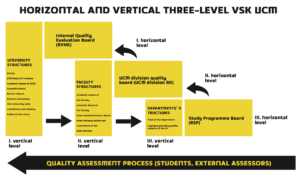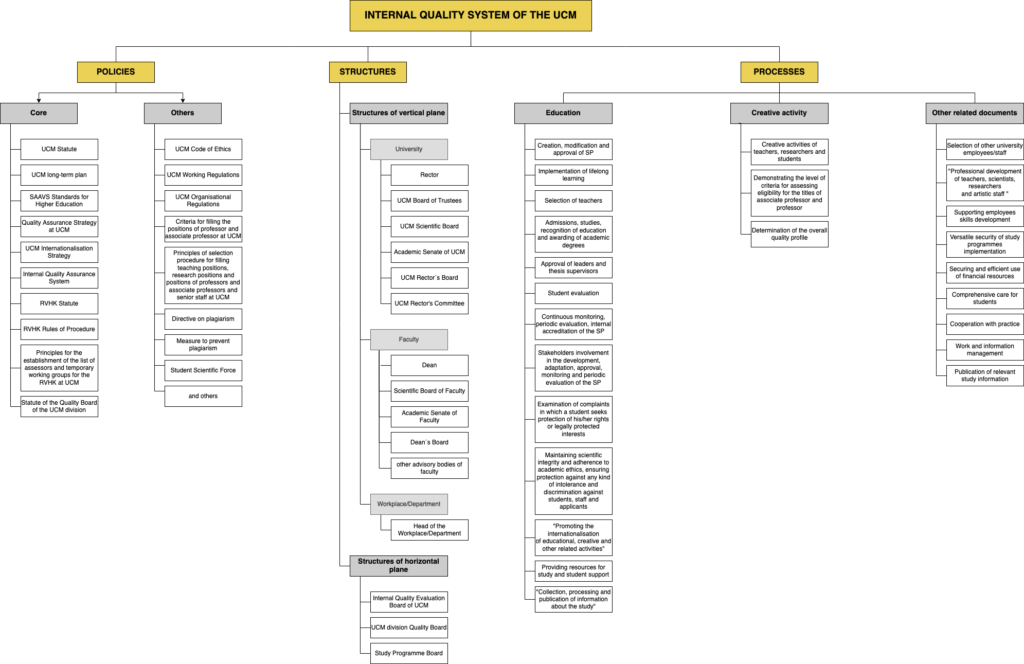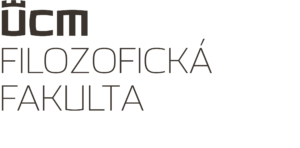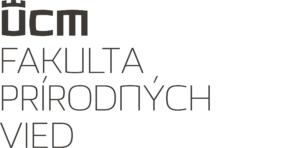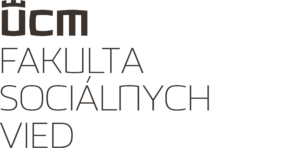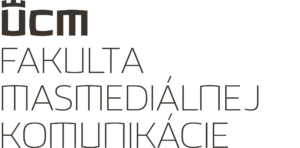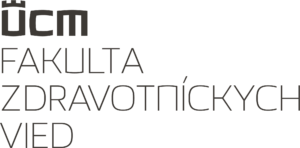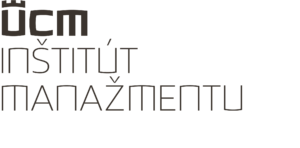UCM Internal Quality System
Quality assurance at UCM
The Internal Quality Assurance System for Higher Education at UCM (hereinafter referred to as the “VSK”) is a set of policies, structures, and processes, through which UCM:
- accepts responsibility for the quality of the education provided at all divisions, at all levels, and in all aspects,
- ensures the quality of higher education in the field of education, creative activities, and other related activities carried out at UCM,
- guarantees quality assurance in accordance with the SAAVS standards for the internal quality assurance system for higher education and with the standards for quality assurance in the European Higher Education Area (ESG 2015),
- fulfils its mission and strategic objectives.
Generally binding legislation
VSK UCM is created and operates in accordance with the wording of generally binding legislation for this area and the area of higher education institutions.
- Act No. 269/2018 Coll. on Quality Assurance of Higher Education and Amendment and Supplementation of Act No. 343/2015 Coll. on Public Procurement and Amendment and Supplementation of Certain Acts, as amended;
- 15 par. 1 letter g) Act no. 131/2002 Coll. on universities and the amendment of certain laws, as amended;
- Decree of the Ministry of Education, Science, Research and Sport of the Slovak Republic No. 246/2019 Coll. on the procedure for obtaining scientific-pedagogical titles and artistic-pedagogical titles of associate professor and professor;
- Decree of the Ministry of Education, Science, Research and Sport of the Slovak Republic No. 244/2019 Coll. on the system of fields of study in the Slovak Republic;
- Decree No. 16/2016 Coll. of the Ministry of Education, Science, Research and Sport of the Slovak Republic establishing professional organisations whose members exercise regulated professions with the right to use professional titles and regulated professions with coordination of education;
- Slovak Government Regulation No. 296/2010 Coll. on professional competence for the exercise of the health profession, the manner of further education of health professionals, the system of specialisation fields, and the system of certified work activities, as amended;
- Standards for Internal Quality Assurance System of Higher Education issued by SAAVS.
Principles
The VSK UCM is designed and implemented on clear principles.
- Students and external stakeholders are involved in quality assurance.
- Education and creative activities are intertwined, with the level and focus of creative activity corresponding to the level of higher education and the learning outcomes.
- The internationalisation of educational, creative, and other related activities is encouraged, and the degree of internationalisation is consistent with the mission and strategic goals of UCM, the objectives, and outcomes of education, and the needs of stakeholders.
- Students, staff, and applicants are protected against any kind of intolerance and discrimination.
- Maintaining scientific integrity and adherence to academic ethics, vigilance against plagiarism and other academic frauds are guaranteed and enable their detection and ensure that consequences are drawn.
- The mechanisms for reviewing complaints by which a student seeks protection of his or her rights or legally protected interests or points out specific deficiencies in UCM’s activities or inaction are effective and transparent.
- The general binding regulations and the internal regulations of UCM are mutually consistent and respected.
- Quality improvement of activities carried out by UCM is continuous.
- A culture of quality is being developed at all divisions and levels of UCM.
- The VSK UCM is intertwined with the UCM Long-Term Plan.
- The performance of administrative activities related to quality assurance is efficient and does not burden teachers, students, and other creative employees of UCM with unjustified bureaucracy.
- Habilitation and inauguration proceedings conducted at UCM meet the SAAVS standards for habilitation and inauguration proceedings.
- Monitoring, evaluation, and revision of the VSK UCM, which involves all stakeholders, and takes into account whether the VSK UCM leads to the achievement of the strategic objectives in the field of quality assurance that UCM has set in its strategic documents, in particular in the UCM Long-Term Plan, are regular.
- Public access to the formalised policies and processes and other documentation of the VSK UCM respects the specific needs of people with disabilities, and the languages of delivery of the study programmes and is easy.
- The basic principles of evaluation and assessment are: transparency, fairness, professional expertise, objectivity, and independence.
- Policies, structures, and processes at UCM are in line with generally binding regulations in force nationally and internationally.
Policies, Structures, Processes
UCM has quality assurance policies in place and follows them consistently. To this end, it has created its own structures and processes, which are interlinked into a compact VSK UCM.
Policies
The policies of the VSK UCM are in line with the mission of UCM as defined in the UCM Statutes and the strategic goals of UCM as defined in the UCM Long Term Plan. UCM’s institution-wide VSK policies are structured into the VSK Quality Area, the Education Quality Area, the Creative Activities Quality Area, and the Other Related Activities Quality Area. The VSK UCM Institutional Policies in the area of quality and development of VSK define the principles, rules, and procedures according to which the quality of educational, creative activities, and other related activities carried out at UCM is continuously monitored, periodically evaluated, and developed. The primary UCM institution-wide policy for the VSK UCM is the VSK Directive.
- Basic institution-wide policies on quality assurance of VSK at UCM
- UCM Internal Regulation No. 3/2020 – Statute of the UCM in Trnava,
- The long-term plan of UCM in Trnava,
- SAAVS standards for the internal system,
- Quality Assurance Strategy at UCM,
- UCM Internal regulation No. 23/2022 – Internal quality assurance system of higher education at UCM in Trnava,
- UCM Internal Regulation No. 3/2022 – Statute of the Internal Quality Evaluation Booard of the UCM in Trnava,
- UCM Internal Regulation of the UCM No. 4/2022 – Rules of Procedure of the UCM Internal Quality Evaluation Board
- UCM Internal Regulation No. 50/2021 – Principles for the Establishment of the List of Assessors and Temporary Working Groups of the Internal Quality Evaluation Board at the UCM,
- UCM Internal Regulation No. 39/2021 – Statute of the Quality Board of the UCM in Trnava Division,
- UCM Internal Regulation No. 40/2021 – Statute of the UCM Study Programme Board at the UCM in Trnava,
- UCM Internal Regulation No. 38/2021 – Directive on External Assessment of the UCM Internal Quality System,
- UCM Internal Regulation No. 25/2021 – Equal Treatment and Protection Directive against Discrimination – Gender Equality.
- Other UCM internal regulations with institution-wide scope in the field of quality assurance – in particular
- UCM Internal Regulation No. 2/2018 – Code of Ethics of the UCM in Trnava,
- UCM Internal Regulation No. 45/2021 – UCM Work Regulations,
- UCM Internal Regulation No. 10/2019 – Organizational Regulations of UCM in Trnava,
- UCM Internal Regulation No. 23/2021 – Criteria for Filling the Positions of Professor and Associate Professor at UCM in Trnava,
- UCM Internal Regulation No. 41/2021 – Principles of the Selection Procedure for Filling Positions of University Teachers, Researchers, Professors and Associate Professors, and Posts of Senior Employees of the UCM,
- Rector’s Measure 1/2023 – Measure to prevent plagiarism at UCM,
- UCM Internal Regulation No. 9/2019 – Directive on plagiarism at UCM in Trnava,
- UCM Internal Regulation No. 15/2019 – Student Scientific Force,
- and others.
Structures
The structures of the VSK UCM form an integrated system. The powers, authority, and responsibilities of the individual structures, including senior staff, other staff, and other stakeholders at UCM are defined by the relevant internal regulations (in particular, statutes, rules of procedure, organisational rules and structures, charters, directives, and procedures). The VSK UCM is three-level system in both vertical and horizontal planes.
Vertical-level structures
Vertical-level structures are primarily responsible for the execution of policies and the delivery of relevant learning, creative, and other related activities.
- The UCM Rectorate is an institution-wide structure. It consists of the UCM management (Rector, Bursar, Vice-Rectors) and the relevant departments of the Rectorate structured in the Rector’s Departments and the Bursar’s Departments following the valid Organizational Structure of the Rectorate. Under the Higher Education Act, the Act on Quality Assurance, the SAAVS Standards for Internal Quality System, the UCM Statute, and the Statute of the RVHK UCM, the person responsible for policies, structures, and processes in the field of quality assurance of higher education at UCM is the Rector. His/her powers, responsibilities, and competencies in the field of quality assurance of higher education at UCM are defined in the UCM Statute, the Statute of the RVHK, the Rules of Procedure of the RVHK, and the Directive on the Creation, Modification and Approval of Study Programmes, Fields of the Habilitation Proceedings and the Inauguration Proceedings and the Submission of Applications to the SAAVS.
The area of quality at UCM is primarily concentrated in the department of the relevant Vice-Rector and the relevant department within the meaning of Article 36 of the UCM Statute in accordance with the UCM Organisational Regulations. The administrative, self-governing, academic, and advisory bodies of UCM with university-wide competence in the field of quality according to the powers, responsibilities, and competencies defined by the internal regulations are:
- UCM Board of Trustees,
- Academic Senate of UCM,
- UCM Scientific Board,
- The Rector´s Board,
- The Rector’s Collegium,
- other university-wide committees and advisory bodies of the Rector.
The competence, powers, competencies, and responsibilities of the Bursar and other UCM employees in the field of quality assurance of higher education at UCM are regulated by the Higher Education Act, the UCM Statute, and other internal regulations.
- The division of UCM (faculty/institute) is a lower-level structure. It consists of the management of the UCM division (dean/director, secretary, vice-deans) and the relevant departments and clerks of the UCM division structured in accordance with the valid Organisational Structure and the Statute of the UCM division. The person responsible for the quality of higher education at the UCM division is the dean of the faculty/director of the institute. His/her responsibilities, powers, and competencies in the field of higher education quality at UCM are defined in the Statute of the Faculty/Institute, the Statute of the Quality Board of the UCM Division, and the Directive on Creation, Modification, and Approval of Study Programmes, Fields of Habilitation and Inauguration Proceedings and Submission of Applications to the SAAVS. The area of quality at the UCM division, in accordance with Article 36 of the UCM Statute, is primarily concentrated in the department of the relevant Vice-Dean and the relevant department/quality manager in accordance with the UCM division’s organisational regulations.
The self-governing, academic, and advisory bodies of UCM with competence at the level of the UCM division in the field of quality according to the powers, responsibilities, and competencies defined by the internal regulations are:
- Academic Senate of the Faculty,
- Scientific Board of the Faculty,
- Dean’s Board/Director’s Board,
- other advisory bodies and committees of the Dean/Director.
The relevant agenda of the institutes as university-wide divisions of UCM is discussed by the VR UCM, AS UCM, and other relevant university-wide structures following internal regulations.
- The workplace (department) is elementary level. It is represented by the management of the department (head of the department, deputy head of the department), the clerk/coordinator/designated person in the department in accordance with the valid Organisational Structure of the department. For each SP there is a group of 5 persons providing profile subjects of the SP, including the person having the lead responsibility for the quality and development of the SP. The responsibilities, competences, powers, and activities of this group are defined by the relevant generally binding regulations. For each OHIK, a group of 5 persons responsible for the quality and development of OHIK is designated, including the person with the main responsibility for the quality and development of OHIK. The responsibilities, competences, powers, and activities of this group shall be defined in the relevant general binding rules.
Horizontal-level structures
Horizontal-level structures primarily ensure the creation and evaluation of policies, structures, and processes through which UCM continuously monitors and periodically evaluates educational and creative activities and other related activities, further assess and approve the creation, modification, implementation, and cancellation of SP, OHIK, the status of the VSK UCM and propose measures to the vertical-level structures to improve the quality and development of UCM.
- The Internal Quality Evaluation Board of the UCM (hereinafter referred to as “RVHK”) is the university-wide structure for quality assurance of education at UCM. The RVHK is an independent advisory body to the Rector. The composition, competences, responsibilities, and powers of the RVHK are defined in the Statute of the RVHK and the Rules of Procedure of the RVHK. For the assessment of the education agenda, the RVHK establishes temporary working groups in accordance with the Principles for the Establishment of the List of Assessors and Temporary Working Groups at the RVHK at UCM.
- The UCM Division Quality Board (hereafter referred to as the “UCM Division RK”) is a structure for quality assurance of higher education at the UCM Division level with the participation of stakeholders. The UCM Division RK is an independent advisory body to the person responsible for the UCM Division (Dean/Director). The composition, responsibilities, competencies, powers, procedures, and rules for the selection of stakeholders in the UCM Division RK are defined in the Statutes of the UCM Division RK.
- Study Programme Board (hereafter referred to as the “RSP”) is a structure for quality assurance of higher education at the level of the department with the participation of stakeholders. The RSP is the body for monitoring, designing, adapting, and developing the SP. The composition, responsibilities, competencies, powers, procedures, and rules for the selection of stakeholders in the RSP are defined in the Statutes of the RSP at UCM. Each third-level study programme is monitored and evaluated by the relevant Field of Study Committee for Doctoral Studies (hereinafter referred to as the “OK”). The responsibilities, competencies, powers, procedures, and rules for the selection of stakeholders in the OC are defined in the Directive on UCM Doctoral Studies.
Processes
VSK UCM processes ensure and evaluate the quality of higher education at UCM in the following areas:
Education
- Creation, modification, and approval of SPs.
- Implementing lifelong learning.
- Teacher selection.
- Admissions, studies, recognition of education, and award of academic degrees.
- Approval of thesis supervisors.
- Student Assessment.
- Continuous monitoring, periodic evaluation, and internal accreditation of SPs.
- Stakeholder involvement in the development, modification, approval, monitoring, and periodic evaluation of SPs.
- Investigating complaints by which a student seeks protection of his/her rights or legally protected interests, as well as pointing out specific deficiencies in the University’s activities.
- Student-centred learning, teaching, and assessment.
- Maintaining scientific integrity and adherence to academic ethics, ensuring protection against any kind of intolerance and discrimination against students, staff, and applicants.
- Promoting the internationalisation of educational, creative, and other related activities.
- Providing resources for student learning and support.
- Collecting, processing, and publishing information about the study.
Creative activity
- Implementation of creative activities at UCM by teachers, scientific and research workers, and students, especially in the third level of studies, in terms of fulfiling the requirements for creative activities defined by the relevant internal regulations of UCM.
- Continuous monitoring and periodic evaluation of creative activity by area and assessment period:
- Evaluation of the level of creative activity of groups of persons responsible for quality and development in accordance with the requirements of SAAVS and internal regulations of UCM, in particular the Directive on the evaluation of creative activity at UCM,
- Evaluation of the level of creative activity of groups of persons providing profile subjects of the SP, including the person having the lead responsibility for the quality and development of the SP in accordance with the requirements of SAAVS and internal regulations of UCM, in particular the Directive on the evaluation of creative activity at UCM,
- Evaluation of the level of creative activity of teachers, scientific and research staff of UCM in accordance with the internal regulations of UCM, in particular the Directive on the Evaluation of Creative Activity at UCM,
- Evaluation of the level of creative activity of groups of teachers, scientific and research staff of UCM according to the areas of assessment (SP, SO, scientific fields, scientific areas, departments, divisions of UCM, UCM), in accordance with the internal regulations of UCM, in particular the Directive on the Evaluation of Creative Activity at UCM,
- Evaluation of the fulfilment of minimum indicators of creative activity at UCM according to the functional classification of the employee,
- Evaluating creative activity beyond the minimum indicators in order to reward creative activity.
- Demonstrating the level of criteria for evaluating the fulfilment of the conditions for obtaining the title of Associate Professor and the title of Professor at UCM.
- Determining the overall quality profile for the relevant assessment area.
Other related activities
- Selection of other university staff.
- Ensuring the professional development of teachers, scientific, research, and artistic staff.
- Supporting the development of professional, language, digital skills, transferable competencies, and personal development for all employees.
- Spatial, material, technical, informational, and personnel provision for the implementation of study programmes.
- Generating and effectively using financial resources to provide learning and student support.
- Care for students, including personal, career, social, cultural, spiritual, sporting, and other aspects of student life.
- Collaboration with institutions of practice and with specialised teaching facilities for practical teaching, including external educational institutions.
- Gathering, processing, analysing, and evaluating information for the strategic, tactical, and operational management of the delivery and development of curricula, creative activities, and other related activities.
- Publication of information about SPs and their graduates.
- Publication of information on the implementation and functioning of the VSK UCM, the results achieved, and measures taken.
- Creation, implementation, monitoring, and revision of the VSK UCM.
- Regular external quality assessment.
The institutional-wide process for quality assurance of higher education at UCM is the continuous monitoring and periodic evaluation of the fulfilment of the standards for SP, OHIK, and VSK, defined by SAAVS and relevant internal regulations of UCM.
Financial, personnel, and material resources
UCM has sufficient financial, personnel, and material resources allocated for the functioning of the VSK, which correspond to its size and the scope of its educational, creative, and other related activities. In the case of vertical structures, the activity is defined by the job description, function, and position in the organisational structure of UCM and the UCM division within the employment relationship of the relevant staff. In the case of horizontal structures, the activity of the staff concerned is defined by the statutes, rules of procedure, and work schedules of the individual structures, and the status of the staff member is defined by appointment to the structure.
Remuneration for work beyond the scope of duties is determined by the relevant internal regulation of UCM (in particular membership and work in the RVHK, RK, and DPS).
Involvement of students and external stakeholders
Quality assurance at UCM involves students and external stakeholders, especially experts from the academic and scientific research environment, experts from practice, employers’ representatives, and graduates. The procedures, rules, and criteria for the selection of students and external stakeholders in the quality assurance and evaluation processes at UCM are defined by internal regulations, in particular the VSK UCM Directive, the relevant statutes, and rules of procedure of all relevant structures mentioned above. The presence of students and external stakeholders is recorded in the lists of members of the structures and their activities in the minutes of the structures’ meetings.
Comprehensive material on the implementation and functionality of the VSK UCM is the Internal Evaluation Report of the Internal Quality System at the UCM in Trnava (VSK UCM VHS).
List of abbreviations
AR – Academic Year
AS – Academic Senate
CAF – Common Assessment Framework
DPS – Temporary Working Groups
ESG – European Standards for Higher Education
FF – Faculty of Arts
FMK – Faculty of Mass Media Communication
FPV – Faculty od Natural Sciences
FSV – Faculty of Social Sciences
FZV – Faculty of Health Sciences
IM – Institute of Management
KR – Rector’s Board
OHIK – Field of Habilitation Proceedings and Inauguration Proceedings
RSP – Study Programme Board
RK – Quality Board
RVHK – Internal Quality Evaluation Board
SAAVS – Slovak Accreditation Agency for Higher Education
SR – Board of Trustees
SO – Field of Study
SP – Study Programme
UCM – University of Ss. Cyril and Methodius in Trnava
VHS – Internal Evaluation System
VP – Internal Regulation
VR – Scientific Board
VSK – Internal Quality System
VSK VHS – Internal Evaluation Report of the Internal Quality System
VUPCH – Scientific-Artistic-Pedagogical Characteristics


